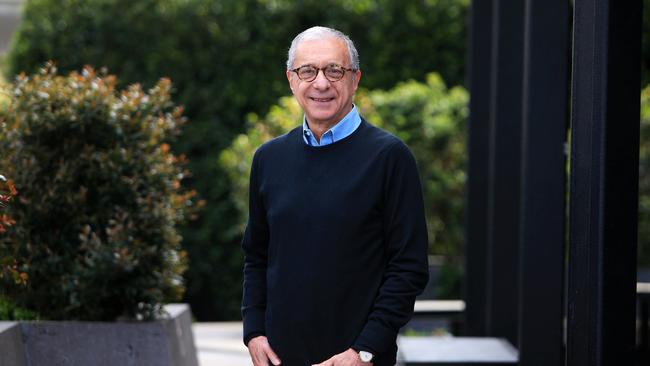No rest for ABC director Joe Gersh in Cromwell boardroom battle
Master networker Joe Gersh will need to balance between both sides of politics to bring peace to the Cromwell boardroom battle.

Joseph Gersh turned 65 on September 21, the same day the late Canadian singer-songwriter Leonard Cohen, former ABC Melbourne broadcaster Jon Faine and former Prime Minister Kevin Rudd all celebrated birthdays.
Gersh’s milestone was supposed to be enjoyed in London during the first sabbatical of his life, a time of reflection and a chance to pursue a few business opportunities at a leisurely pace.
Gersh was so committed to the plan he had bought an apartment in the Shoreditch district in the city’s East End and by mid-March had settled there with his new partner following an amicable separation from long-time wife Zita.
“I thought I would take a gap year in what used to be called the retirement year, not the backpacking year,” Gersh tells The Weekend Australian. Then all hell broke loose. “The DFAT notice came to hurry home. I booked to make sure I had 14 clear days before the Passover meal. But by the time I got back and had done self-isolation — thankfully I got back in time to beat the mandatory hotel quarantine — there were no Passover meals anyway,” he says of the COVID lockdown that entombed him in his South Yarra apartment for many of the months that followed.
“It was a great plan and a dream come true. But alas it didn’t happen.
“It seems I’m destined not to have a gap year.”
But Gersh’s rapid return to his homeland was fortuitous. It reunited him with his old law firm, Arnold Bloch Leibler (ABL), and landed him on his first listed public company board in his favourite sector, property.
In June Gersh was nominated by Singaporean property investor ARA Asset Management to become a director of Cromwell Property Group during a protracted battle for control of the Australian group with the Singaporeans. “I said I would do it, without realising I was walking into the corporate battle it turned out to be.
‘It is very clear that history has repeated itself. I am now in a complex board room situation, as I was with the ABC,’’ he says, in reference to his directorship of the national broadcaster, which he accepted just before the sacking of then managing director Michelle Guthrie by the board.
Gersh came into ARA’s sights because he runs his own real estate investment and advisory group known as Gersh Investment Partners. One of its first clients was retail billionaire Marc Besen and its biggest is now Thai group Supalai, which six years ago gave Gersh a mandate to source investment partners for development projects in Australia.
Gersh’s Cromwell journey started with a call from Jeremy Leibler, a partner at ABL where Gersh had spent 19 years of his life, starting as an articled clerk in 1980 before becoming a partner at the age of 26 in 1982.
During a hiring spree backed by Jeremy Leibler’s father, ABL managing partner Mark Leibler, Gersh recruited now ABL stalwarts Henry Lanzer and Leon Zwier.
All went to Mount Scopus College, studied law at Melbourne University and were active in Jewish student politics.
Trouble and strife
“Jeremy Leibler called and asked if I was prepared to put my name forward for Cromwell. The little I know about ARA makes me respect them, but I don’t really know them. The field of Cromwell is real estate which is my field of expertise and they thought I might be able to add value,” Gersh says.
It was his ABL background that Cromwell initially argued should disqualify him from being considered an independent director, given ARA is a client of the law firm. “Which is true, but it was 20 years ago,” Gersh quips in response.
“The other complaint was that I had not previously been on public company boards. Which is technically correct. But they failed to mention I have been on any number of boards that were governed by legislation at least as prescriptive as the Corporations Law. For example the ABC and the RBA, (Gersh was on the Reserve Bank’s Payments System Board for over a decade) both have strict corporate governance.”
In September, with ARA’s backing, Gersh and famed corporate raider turned turnaround specialist Gary Weiss succeeded in securing board seats at Cromwell.
“I can look at the direction of the company in an objective way. Look at the balance sheet and see if the strategy makes sense given what they are trying to achieve, particularly since COVID,’’ Gersh says.
“Until you really get the detail, it is very difficult to speak from the outside. You need to be in the boardroom and abreast of all the knowledge before you can see where you can add value.
“My preference for the first few meetings was to listen rather than talk. However, circumstances arose that made it necessary to voice my opinion.”
At Cromwell’s annual general meeting in mid-November the company lost its chairman and two other directors, while the remainder of the board — with the exception of Weiss and Gersh — now face a spill motion within 90 days after ARA flexed its voting muscle at the meeting.
Gersh is careful with his words in the wake of the board ructions.
“I remain committed to doing whatever I can to assist Cromwell to stabilise and prosper in the wake of the recent turmoil, both in a corporate sense and as a consequence of COVID,’’ he says.
“What happened was unfortunate but was perhaps inevitable. It would be inappropriate to say anything further at this point.”
Gersh had a dress rehearsal for his Cromwell experience within four months of his appointment to the ABC board in 2018 when the directors ganged up to sack Michelle Guthrie.
She was dismissed on the same day the board commissioned a private investigation into her allegations of inappropriate conduct against then chairman Justin Milne.
Gersh was selected by the board to meet with Guthrie to discuss the allegations against Milne — which he did so in a coffee shop — and then two months after Guthrie’s departure, he was required to appear before a Senate committee into the scandal.
“I didn’t realise when I was appointed to the ABC board that there were unresolved issues at board level. I was appointed in May and the managing director and chair left in September. That was something I wasn’t expecting. Nor was I expecting to be called to give evidence at a Senate committee, nor did I expect the coffee meetings I had would be subject to a Four Corners program. So that wasn’t what I expected,” Gersh says.
As easy as ABC
Last April the committee, which was investigating allegations of political interference in the Guthrie affair, found that the appointment process for ABC board members “should incorporate higher standards of transparency and accountability”.
The appointments of Gersh, Donny Walford and Vanessa Guthrie were “captain’s pick” ministerial appointments by the Communications Minister Mitch Fifield, and the chair, Ita Buttrose, was chosen by Scott Morrison.
Wearing his ABC hat, Gersh courted controversy again earlier this month when he penned an opinion piece for The Australian in the wake of attacks on the national broadcaster after a Four Corners investigation alleged two federal ministers engaged in affairs with younger female staff. In the piece he claimed the ABC did not need “redemption” but rather stable funding in today’s disrupted media environment.
Gersh declines to comment further on the piece, but says the ABC needs to continue to prosecute its case for adequate funding.
“I understand the position of both sides. The ABC can’t work outside of its financial parameters. And the whole media landscape is changing rapidly. The ABC must continue to provide value for the taxpayer money that is provided to it,” he says.
“The notion that money is tight in the media industry is not peculiar to the ABC. I’m not giving away any secrets to say there is a focus at board level on the financials. There has to be.”
Gersh says despite the controversies associated with his ABC role, he is glad to have joined the board.
“The interaction with the ABC is interesting, to use a word. I come politically from the Centre Right, so the way that views the ABC from the other side interests me. We do not editorially interfere; we can’t. The ABC does take its charter seriously. So just watching it I find very interesting,’’ he says.
“The subject matter is fascinating. It is about public affairs, digital transformation, the whole Australian conversation actually. It is a great pleasure working with Ita,’’ he says of Ita Buttrose, who he describes as a “national icon”.
“Everyone knows her, so she has great access and entree. Her communication skills are obviously excellent but people want to listen to what she has to say. She has a real passion for the ABC. She is also inspirational. She is well into her 70s and operating at a very fast pace. She understands media, politics, is well respected, is careful and considered. The board works very harmoniously with her. (Chief executive) David Anderson is also very capable and well liked. He has integrity: people accept and respect his leadership.”
It was Gersh’s impeccable network of connections built over many decades that put him in the frame for the ABC board position and other public service roles.
Fierce intellect
When he was treasurer, Peter Costello — a long-time Gersh associate and friend — appointed him to be a foundation director of the Reserve Bank’s Payments System Board. He spent 15 years in the role after being reappointed by Labor treasurer Wayne Swan.
Gersh also spent four terms as chairman of the Australian Reinsurance Pool Corporation, his last two while Labor was in power.
Gersh, who is also on the board of The Sydney Institute, is clear he has never hidden his political views. Yet somehow he has managed to cleverly walk a fine line between both parties.
“I believe I’ve been appointed to the various boards on merit. And my political views are not relevant in the discharge of the various tasks I have been assigned. The one lesson I was taught early is don’t pretend to be someone you are not. The people in politics respect people who understand politics, can hold a brief and discharge a brief,’’ he says.
Gersh is also quick-witted and has the gift of the gab.
Seek co-founder Paul Bassat, who was Gersh’s articles clerk at ABL, remembers them together encountering the wrath of the legendary Irvin Rockman, the former Melbourne lord mayor who was one of the biggest original backers of Seek, now an online classifieds juggernaut.
Bassat remembers Rockman complaining one day about how much ABL charged for photocopying — $1 per page versus Blake Dawson’s 10c.
“Joe said to him ‘I’ve got a good idea for you Irvin’,” Bassat recalls.
“Why don’t you use Blakes for your photocopying and ABL for your legal advice?”
Gersh remains a client of ABL but these days has little direct interaction with the firm known for taking on some of the toughest corporate cases in the courts.
“I have a very warm and affectionate feeling towards ABL, especially its senior people,” he says.
Not everyone’s cup of tea
But Gersh isn’t everyone’s cup of tea. Some describe him as aloof and arrogant. Others call him an opportunist and a great self-promoter, perhaps evidenced by the fact he has his own personal website joegersh.com.
He has fallen out with members of the Jewish community over time. But none doubt his intelligence. “He is a fierce intellect and very strategic and very smart,’’ says one observer.
Gersh is also very well read. He credits his love of reading to former Melbourne University Press publisher Louise Adler, who was his classmate in English literature studies at Mount Scopus College.
Put to Gersh whether he sees himself as a power player in business and politics, he replies: “I will take the compliment but I’m not sure it is true. People make something of my connection with Peter Costello over the years. He was and is a great friend. I hope I understand how politics works which helps in guiding clients both in the law and in my current business. because people have a strange perspective on what they can expect from or achieve with government. And how to speak to government. If I am a power player I hope I am using it for good, not evil,’’ he says.
Melbourne’s COVID lockdown denied Gersh his weekly sojourns to his 80-acre Merricks Grove vineyard at Merricks North on the Mornington Peninsula, which grows pinot noir and Chardonnay grapes for the prestigious Red Hill Estate.
It boasts a home designed by star architect Randall Marsh. Gersh and Zita — who have four now adult children — bought the property in 2003 and built the house in 2009, just as Gersh was going through the biggest financial crisis of his life.
Financial crisis
In August 2007 he sold his property business to the listed developer MFS for an implied value of $100m, 70 per cent of which was in escrowed shares. He was worth a fortune on paper but it earned him critics, some claiming it stoked his ego and made him dismissive of others.
He was brought down to earth quickly when MFS collapsed a few months later as the GFC took hold. In March 2008, he paid $20m to buy his company back.
“As MFS was collapsing around me we were just a slab on the ground at Merricks, we hadn’t built, and I decided it was now or never,” Gersh recalls.
“So we built it. It is still standing and I am still standing.”
Some find it strange that Gersh has chosen to take his first listed company directorship at a time when directors and boards are under more pressure than ever from their various stakeholders and regulators. He’s chosen one of the hottest seats going in Cromwell. But given the collapse of his sabbatical dream, perhaps it was meant to be.
“That is the first thing that goes through your mind these days — is the company solvent, is it likely to lead to reputational damage? I am reasonably confident the company is solvent and the reputational damage would only come if I acted in an improper way, which is not going to happen,’’ he says.
There is a time trade-off to be made, given his day job at Gersh Investment Partners and his ABC duties. “But to be honest I find the challenge interesting,” he says.








To join the conversation, please log in. Don't have an account? Register
Join the conversation, you are commenting as Logout